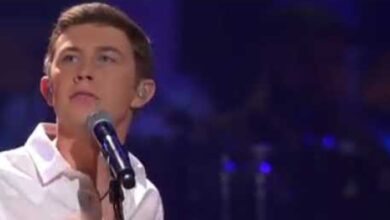Pain in his voice; two months after this performance he died, his roar still lion-like
Johnny Cash’s final live performance took place on July 5, 2003, at the Carter Family Fold in Hiltons, Virginia, marking a bittersweet chapter in the legendary musician’s storied career. At 71 years old and in frail health, Cash’s appearance on stage was a testament to his enduring passion for music and his unwavering dedication to his craft. Just two months prior, he had lost his beloved wife, June Carter Cash, whose passing deeply affected him. Despite his physical frailty, Cash’s presence exuded a quiet strength and resilience that resonated throughout the venue.
Accompanied by a small ensemble that included his son, John Carter Cash, on vocals, Jerry Hensley on guitar, and Bobby Starnes on bass, Cash opened the concert with his trademark introduction: “Hello, I’m Johnny Cash.” This simple greeting, etched in the annals of American music history, set the tone for an evening filled with poignant nostalgia and profound emotion. The set list featured many of Cash’s timeless classics, such as “Folsom Prison Blues,” “I Walk the Line,” and the iconic “Ring of Fire,” songs that had defined his career and endeared him to generations of fans worldwide.
Throughout the performance, Cash’s voice, though weathered by age and illness, retained its distinct timbre and emotional depth. Each lyric seemed to carry the weight of a lifetime of experiences—hardship, love, redemption—all themes that had been central to Cash’s songwriting. A particularly touching moment came during his rendition of “Angel Band,” a song previously sung by Emmylou Harris at June Carter Cash’s funeral. As he sang, Cash’s vulnerability and grief were palpable, resonating deeply with the audience and showcasing the raw honesty that had always characterized his music.
In a surprising turn, Cash also performed “Understand Your Man,” a song he hadn’t sung in over 25 years. This unexpected choice added a layer of nostalgia and reflection to the evening, as Cash revisited a piece from his earlier repertoire, perhaps hinting at the cyclical nature of life and his own journey as an artist.
Beyond the music, Cash’s interactions with the audience revealed a man grappling with personal loss yet finding solace in the connection forged through his songs. He spoke openly about June’s enduring presence in his life and the profound impact she had on his career and personal happiness. This transparency not only underscored Cash’s deep emotional ties but also reinforced his reputation as a musician who seamlessly intertwined his personal experiences with his artistry.
Johnny Cash’s legacy transcends mere musical accolades. Born in 1932 in Kingsland, Arkansas, he emerged as a pivotal figure in American music, blending elements of country, rock, and folk into a distinctive sound that defied categorization. His deep baritone voice and rebellious spirit made him an icon of authenticity and resilience. From his early hits like “Cry! Cry! Cry!” to later classics such as “Man in Black,” Cash’s music reflected his unyielding commitment to truth-telling and his empathy for the marginalized and downtrodden.
Beyond his musical achievements, Cash’s humanitarian efforts left an indelible mark on society. He famously performed concerts in prisons, advocating for prison reform and humanizing those behind bars through his music. His empathy for the oppressed resonated deeply with audiences worldwide, earning him respect not only as an artist but as a compassionate advocate for social justice.
As Cash took his final bow at the Carter Family Fold that summer evening, he left behind a legacy that continues to inspire and resonate with fans and musicians alike. His ability to channel life’s struggles and triumphs into timeless melodies remains unmatched, solidifying his place in the pantheon of American music legends. Johnny Cash’s final performance was more than just a concert—it was a poignant farewell from a man who had dedicated his life to the pursuit of truth, artistry, and the enduring power of music.





